A large glass pitcher with freshly squeezed juice from local oranges or full of clear squashes and cordials, placed on a lace mat, was one of those classic, timeless sights on the Coorg table. It always appeared at a particular moment in the life of a busy household when, everyday, there was a pause, and everyone caught their breath. Hot, thirsty, dust-covered children raced in to snatch a glassful of refreshing squash before they ran off again. Just about anyone who wandered by stopped, almost absentmindedly, to have a drink. Aunts and grandmothers left the kitchen and a long morning’s cooking to sit down and sip something and chat. It was one of those beautiful, suspended moments, so easy to create in the midst of our busy lives; but more often than not, we miss it. We are mostly too busy to pause in the middle of the morning –in fact, to pause at all.
The rich abundance of Coorg’s fruits found its way into bottles of bitter orange, Indian gooseberry, ginger-lime and passion fruit squash in most households. Fresh fruit squash was always there and it drew you back –and maybe that’s how tastes were shaped: because even today, nothing that comes out of a carton or pre-packed in a bottle can compare with a home made squash. Over time, that glass pitcher became a sort of symbol of a particular way of life in which you knew where most of the produce that made its way into your kitchen and onto your table came from –you grew it.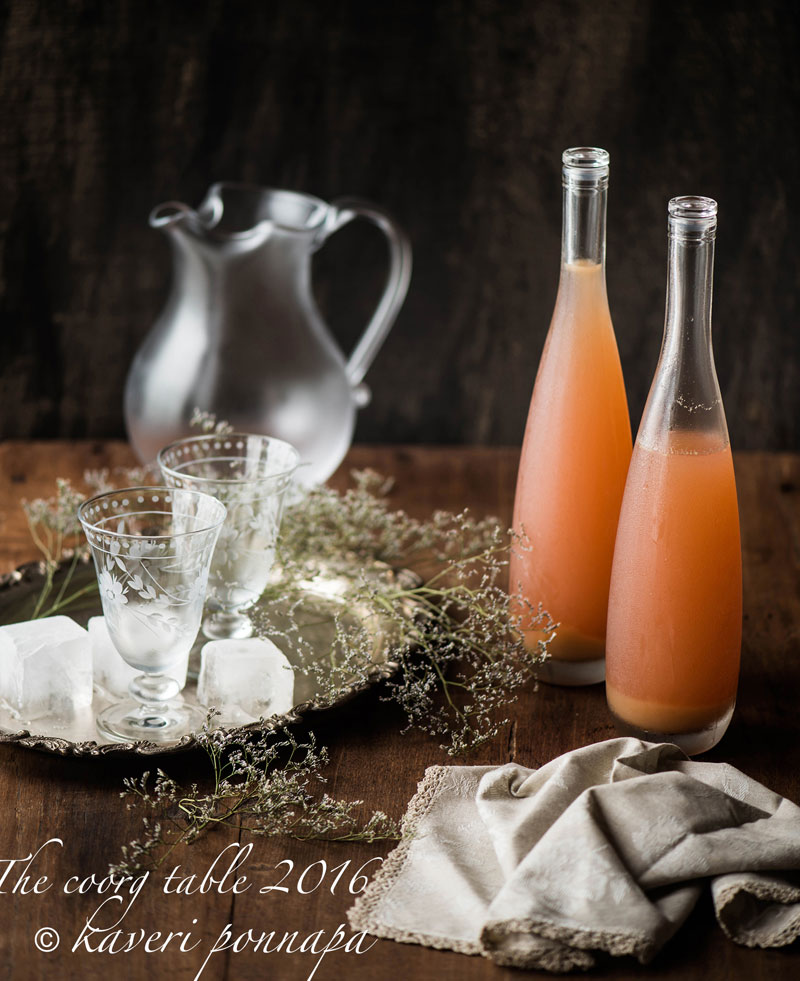
Of late I’ve been thinking about many women of an earlier generation and remembering others that I used to know. Their days seemed so ordinary: what, I wonder, inspired them to cook meal after meal, three times a day, all through their lives, cooking from scratch –which was the only way we cooked not so long ago –for large numbers of people. They managed coffee estates and rice fields all day and then stayed up until after midnight making heaps of delicious snacks to store away in knee high, recycled biscuit tins, always generous and caring.
Was it the moments of beauty they created for themselves in turning out perfect dishes with ingenuity and imagination, from naturally good raw materials –which is why I have always cooked? Or did they feel the way that I do when I shut myself in my store every morning after breakfast, opening cupboards, and breathing deeply, happily, taking stock of all the ingredients carefully and lovingly stacked up inside that I can bring together in many harmonies through the day, feeling like M.F.K Fisher when she wrote: “The store, the bins, the cupboards, I had learned forever, make an invisible throne room. From them I ruled; temporarily I controlled. I felt powerful, and I loved that feeling.” And there is great power in food, in the cooking and sharing and feeding.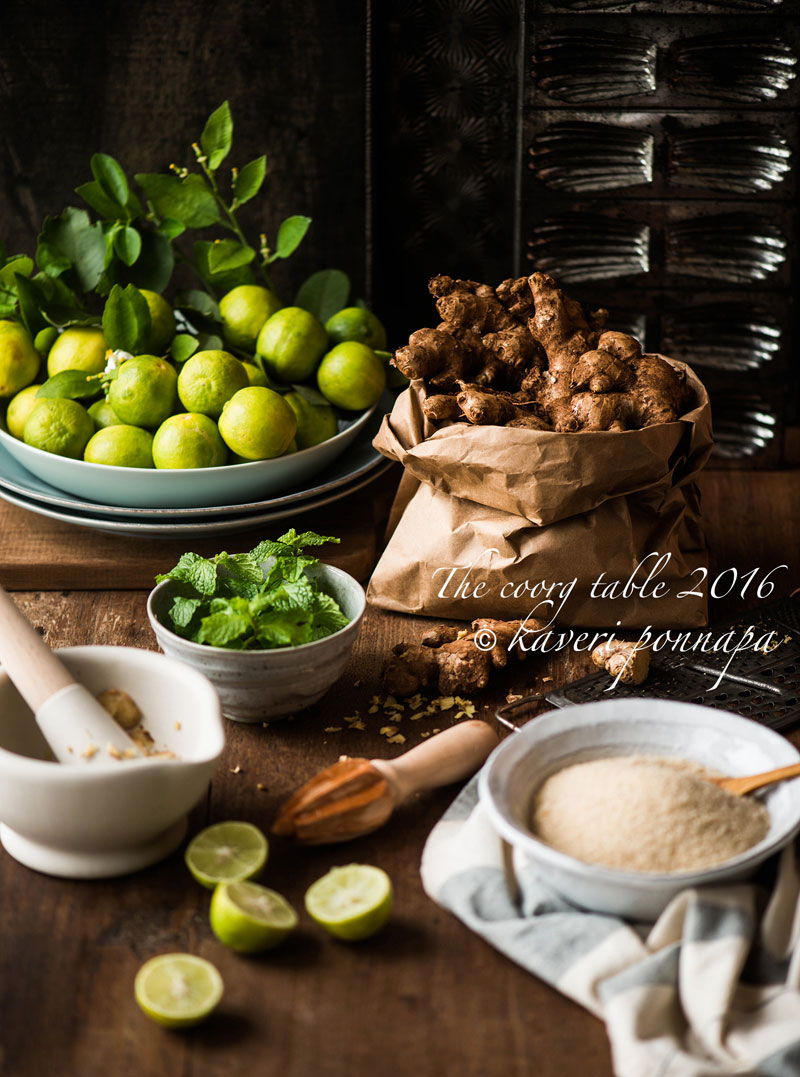 A part of the answer lies, I feel, in the beauty of the ordinary that is everywhere, where every part of the day, each task becomes its own perfect moment, as rich and satisfying as any grand project that we might undertake. On a remote coffee plantation, miles from anywhere, no matter how rushed the events of the day, my grandmother would spread out a pretty tablecloth, and make sure the smallest children in the house had their own miniature glasses from which they drank fresh juice. Some of this comes back in unexpected ways, in the moments that we choose to recreate for other generations, in other places and times. Colas, bottled and canned drinks never made their way into our home when my children were very small persons; it was always fresh squashes and juices, with some pretty glasses (that are still around) turning the mundane into something rather special.
A part of the answer lies, I feel, in the beauty of the ordinary that is everywhere, where every part of the day, each task becomes its own perfect moment, as rich and satisfying as any grand project that we might undertake. On a remote coffee plantation, miles from anywhere, no matter how rushed the events of the day, my grandmother would spread out a pretty tablecloth, and make sure the smallest children in the house had their own miniature glasses from which they drank fresh juice. Some of this comes back in unexpected ways, in the moments that we choose to recreate for other generations, in other places and times. Colas, bottled and canned drinks never made their way into our home when my children were very small persons; it was always fresh squashes and juices, with some pretty glasses (that are still around) turning the mundane into something rather special. 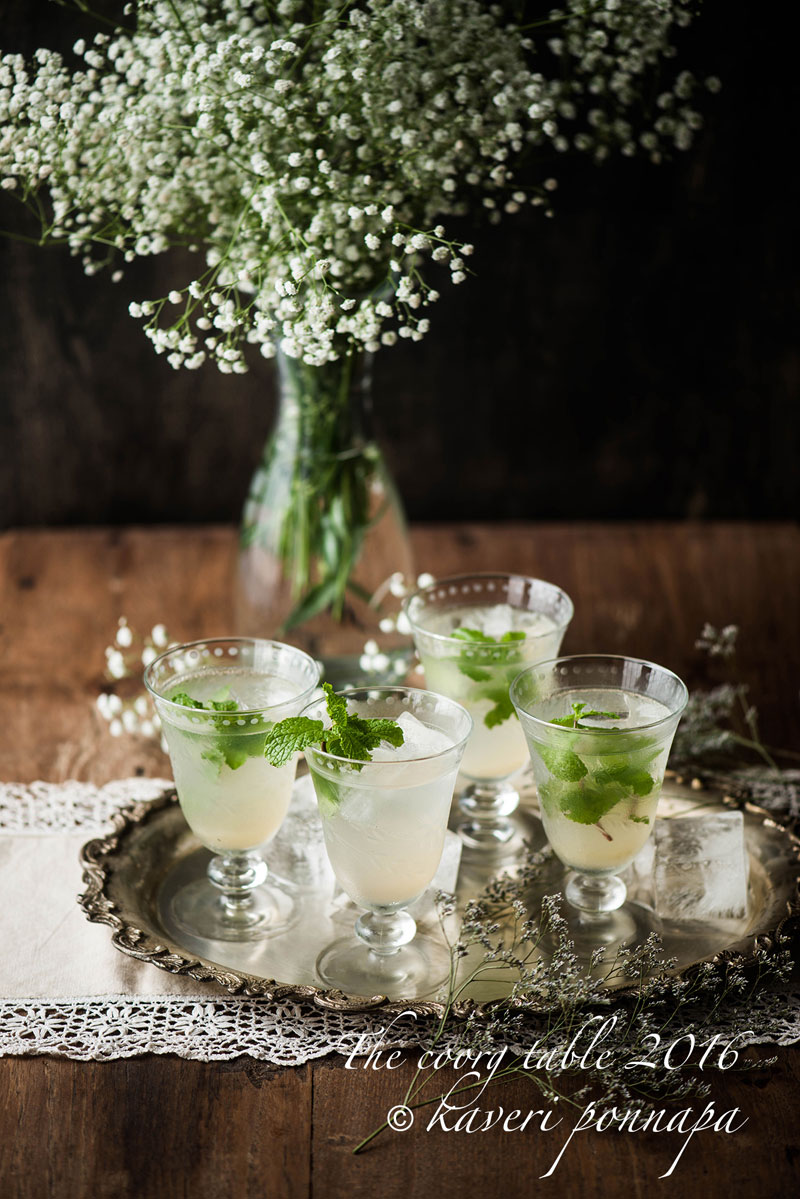
This year I made the perfect ginger-lime squash to my taste. Ginger has been cultivated in Coorg for generations, highly valued for all its curative and stimulating properties. But there’s a deeper association I love that is all to do with these same women –hard working, resourceful, generous and strong –who have left us this culinary legacy. Ginger and turmeric plantings were the preserve of women; the income that was generated from their cultivation was exclusively theirs, by custom. So in the Coorg marriage contract, the bride’s rights to ginger and turmeric fields were publically announced and secured, giving her that all important right to the profits of her enterprise and hard work. They were far more modern than we could ever have imagined.
Countless bottles of ginger-lime squash have been made in countless homes for as far back as we can recall, but this turned out to be my ideal version of a well-loved classic. It’s a winning combination of fierce ginger and sharp lime, softened with just the right sweetness. The bonus is the beautiful shade of pink that comes from doing away with preservatives and using raw, un-boiled limejuice. The ginger settles to the bottom neatly and has to be shaken to life before pouring it out, fiery and reviving. I could have made it just that much healthier by using jaggery syrup, but that would have meant losing the lovely pink, so a compromise was made.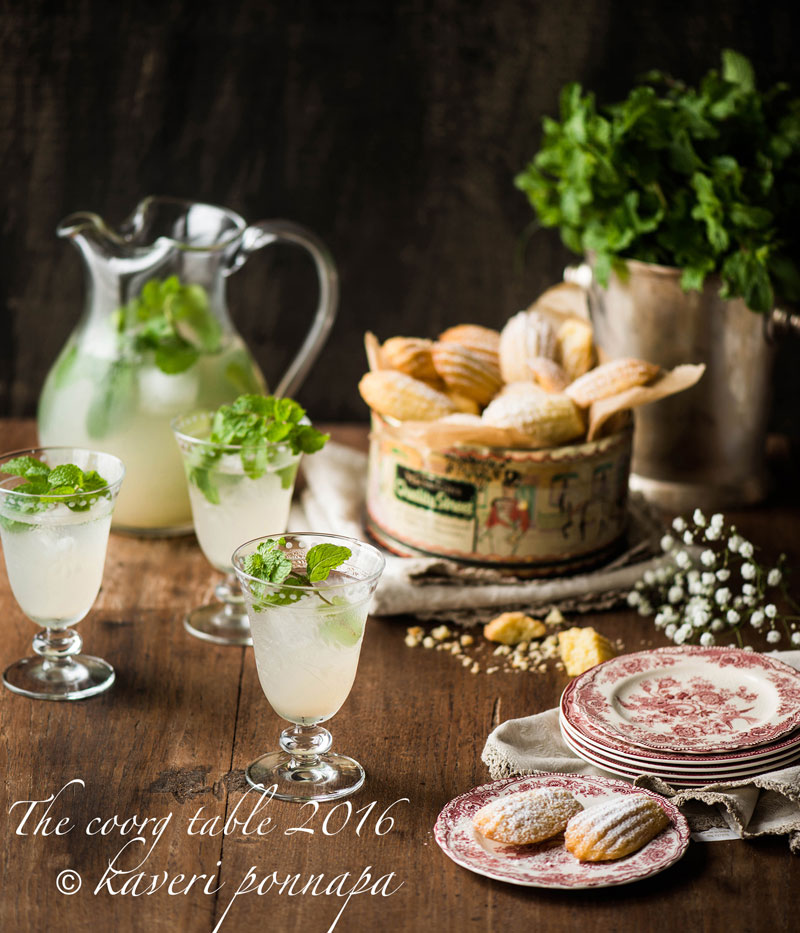 The citrus fruits that grow in Coorg are rich, juicy and loaded with flavour, and this squash shows off the qualities of our native limes. Here in the city, most often the ginger I use is store bought, and if the bags of produce sent by friends don’t arrive in time, so are the limes. I hope someday that I’ll have limes and ginger that I’ve grown myself. In the meanwhile, when I take a break from my routine, somewhere in the background is an image of that iconic pitcher on a dining table set in a calm pause, before life rushes on again. I guess this is what you might call the art of slow living and you can practice it wherever you happen to be.
The citrus fruits that grow in Coorg are rich, juicy and loaded with flavour, and this squash shows off the qualities of our native limes. Here in the city, most often the ginger I use is store bought, and if the bags of produce sent by friends don’t arrive in time, so are the limes. I hope someday that I’ll have limes and ginger that I’ve grown myself. In the meanwhile, when I take a break from my routine, somewhere in the background is an image of that iconic pitcher on a dining table set in a calm pause, before life rushes on again. I guess this is what you might call the art of slow living and you can practice it wherever you happen to be. 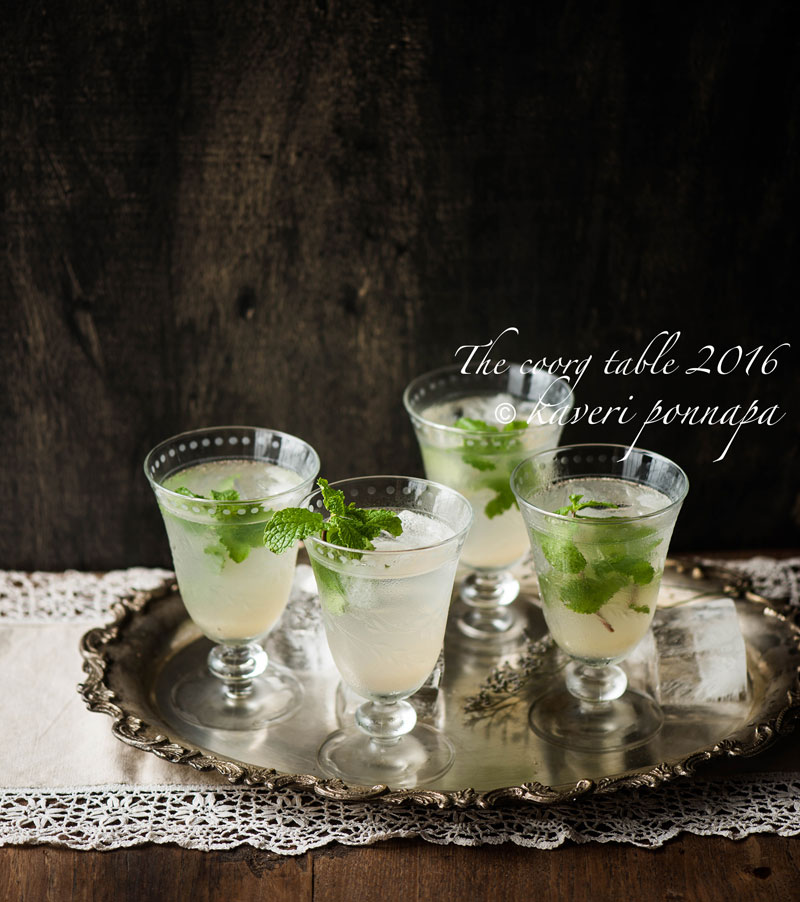
Ginger Lime Squash Recipe
Ingredients:
- 200gms fresh ginger
- 650-700gms sulphurless sugar, or according to taste
- 400ml freshly squeezed lime juice
- 1 ltr water
Method:
- Scrape away the skin of the ginger and grate finely.
- Put the water, sugar and grated ginger in a heavy based saucepan or vessel and bring slowly to the boil.
- Stir and cook until the mixture thickens slightly, and begins to look glazed and syrupy.
- Remove from the heat, cool and stir in the lime juice. Or, if you prefer, add the lime juice to the hot liquid, and give it a quick boil for a few minutes.
- Cool the squash completely before bottling in a sterilized preserving bottle.
Cook’s Note : : I prefer not to use the traditional preservative of potassium metabisulphite. I just refrigerate the ginger lime squash. It keeps very well for up to 3 weeks, if your squash lasts that long! You can use strained jaggery syrup instead of sugar to give you a more earthy and healthy option. The colour of the squash will not be the same though.
Photo Credits: Nithin Sagi
All Food Styling: Kaveri Ponnapa
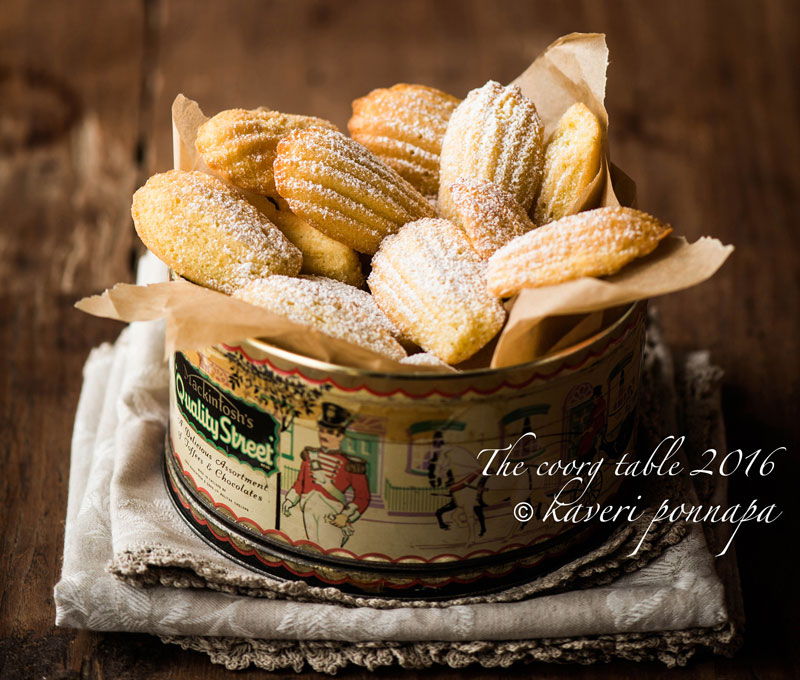 Thank you for visiting this page. If you read something that you enjoy, or see an image that you like, please take a moment to write a response. Do look out for the recipes of all the food featured here in my upcoming cookbook.
Thank you for visiting this page. If you read something that you enjoy, or see an image that you like, please take a moment to write a response. Do look out for the recipes of all the food featured here in my upcoming cookbook.

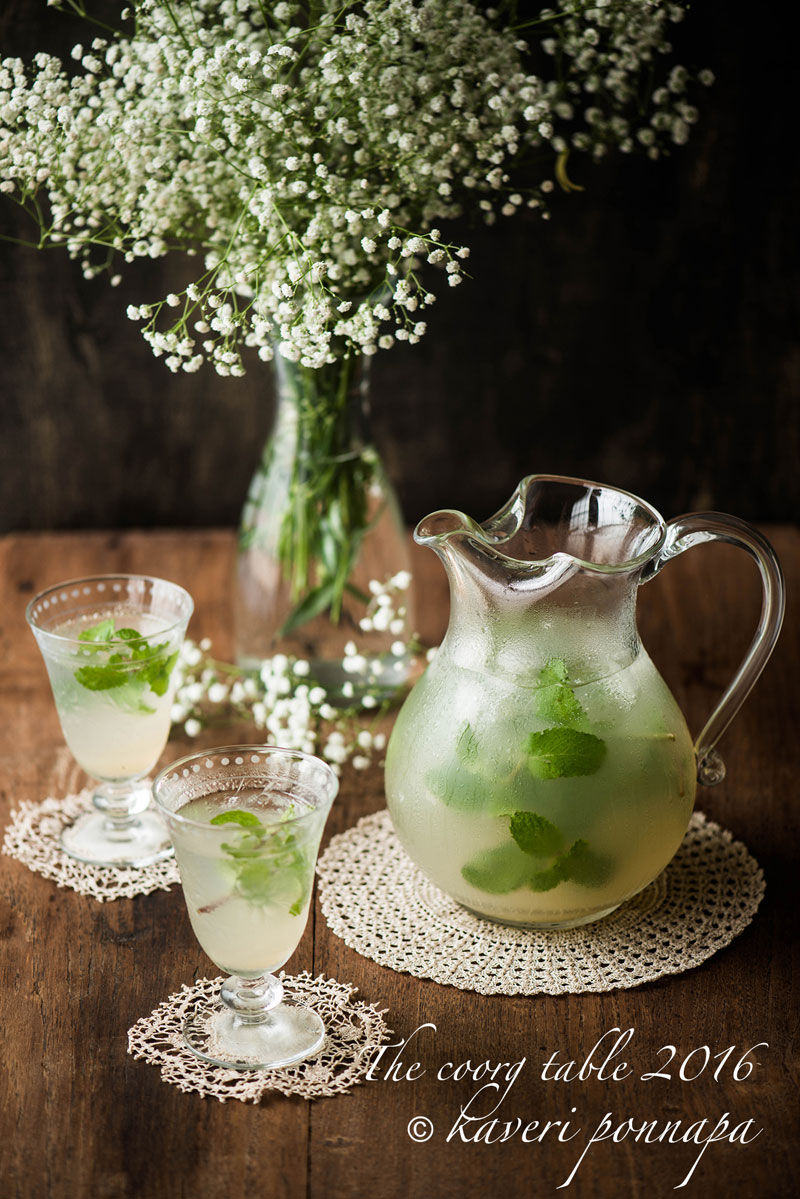
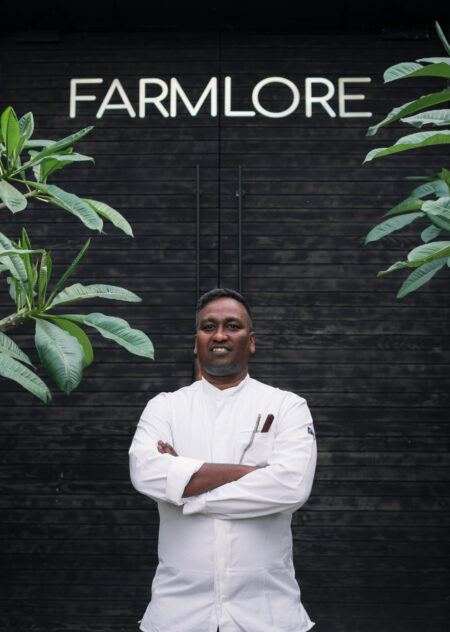


Hi Kaveri
Love the narrative ! And the images too !!! You bring in so much richness to the simple ingredients that you use in your recipes. And the presentation of it adds in more beauty and warmth .
I must say , your style and narration is one of a kind I have come across in all the cookbooks I have read so far.
This post particularly , is such a sweet gentle nudge insisting us to go back and reflect on the slow carefree way of life we enjoyed in our childhood days . ..plcking the fallen ripe Indian berries and taking it home to mother to make pickles out of them is one such memory which came to my mind when I read this post.
Thanks and Best Wishes Always .
Hello Neelam, I’m so happy this post stirred beautiful memories for you. I feel that the days you describe, the slow days we knew, cherishing every small offering from nature, are days that are still possible to experience. Maybe with a little more effort, maybe with the exclusion of quite a lot of other ‘stuff’-but still possible. I hope that you find many such days. Thank you for reading this post, and even more for taking the time to share your thoughts. Warm wishes. Kaveri
This is such a wonderful read, particularly a summer read. Like others have commented, this brought back childhood memories. Gooseberries (I think you call then Indian gooseberries), tart, and eaten with salt and fiery hot peppers mashed together to make a pink-reddish mixture. Pitchers of fresh limeade which we call swank and snow cones!
Thank you very much, Cynthia, it’s wonderful when a post I have written triggers personal memories for people in different parts of the country and the world that may be specific to their culture and tradition, but universal in the way that we love and appreciate food.’The gooseberries you describe sound so delicious, and ‘swank and snow cones’-what a delightful name! Thank you for sharing, and I hope that you will share more soon.
Radhika, I love reading your posts and often read past posts. Today I was reading this one and it brought me back to my life in Colombia when we would have all kind of fresh juices of the best fruits ever-mango, lulo, pineapple, pears, cherimoya…. at the beginning of each meal we would have a glass of fresh juice waiting for us. It was such a “delicious” treat but I don’t think, at the time, I appreciated it as much as I should have as it also meant the family was together to share the meal.
I really enjoy reading your posts, as it brings great memories and feel closer to you…. Maria
One of the best things is hearing about how people come back to re-read posts on this blog in an age when people hardly have time to read at all. Thank you very much, Maria, for sharing the thoughts and memories that this post brought to you. Connecting through food is special- it makes me realize how much we have in common, even halfway across the globe, from very different cultures, and somehow all other differences seem to shrink. Waiting to meet again!xo
Your way of expressing simple things is superb Radhika,loved reading it,looking forward to lots more,and guess what I made the squash today and waiting for it to cool down…. will let you know how it turned out,smells delicious!!
Hi Madhavi, I am delighted that you enjoyed the post, thank to very much for writing in. I know that you will love the squash, it is so fresh and gingery, and best of all, free of preservatives. It’s excellent with soda too. Do keep reading these pages, and I’d love to have your feedback on any recipes that you try, I know you’re an expert cook! Warm wishes.
Very good liked the taste of ginger…
I enjoy reading your blog, always it takes back me to my childhood days. Recipes, narration, images are very attractive and too good. Ginger Lime squash I never had will try this. Thanks for wonderful writing….
Hi Kaverappa, if I had just a few more readers like you, who took the trouble to write their responses to every post they enjoyed, I think I would be inspired to post much more often! This ginger lime squash uses no preservatives, and just this morning, I had a friend visit, who simply loved it. Please try it. Thank you very much for sharing your thoughts, and I do hope that you will keep reading these pages. Warm wishes. Kaveri
Often times, more than for the recipes themselves, I keep coming back to these pages to read the things you write about Coorg. Having been born and raised there myself, every image you create takes me back to that land, and thus I find myself reading them again on nights when I’m especially missing home. The photos, the words, all so very lovely. Thank you!
And I can’t wait for your book. I hope it is being published soon.
Hello Deepa, welcome to The Coorg Table. Thank you very much for your appreciation of what goes onto this page. I can see that you relate to the land and way of life deeply. The book is work in progress, and in my experience, books you write seem to have a life and mind of their own – they complete themselves when they decide to! But I do hope to have it out sooner rather than later. Do look out for it, and keep reading these posts. Best wishes. Kaveri